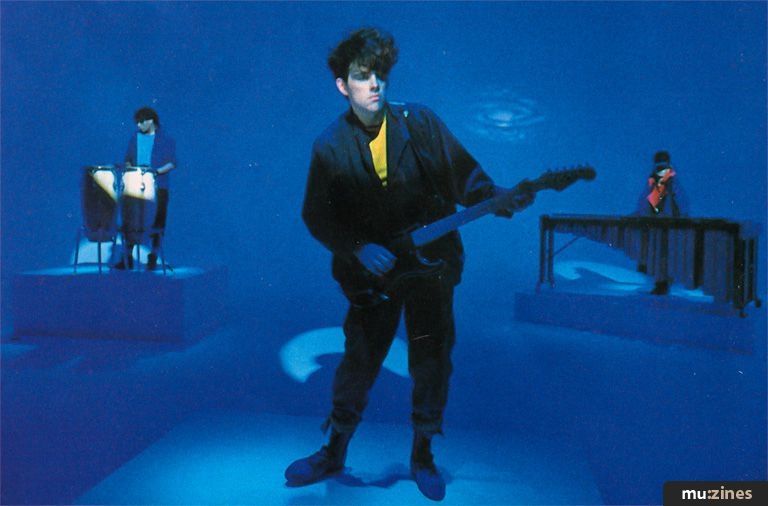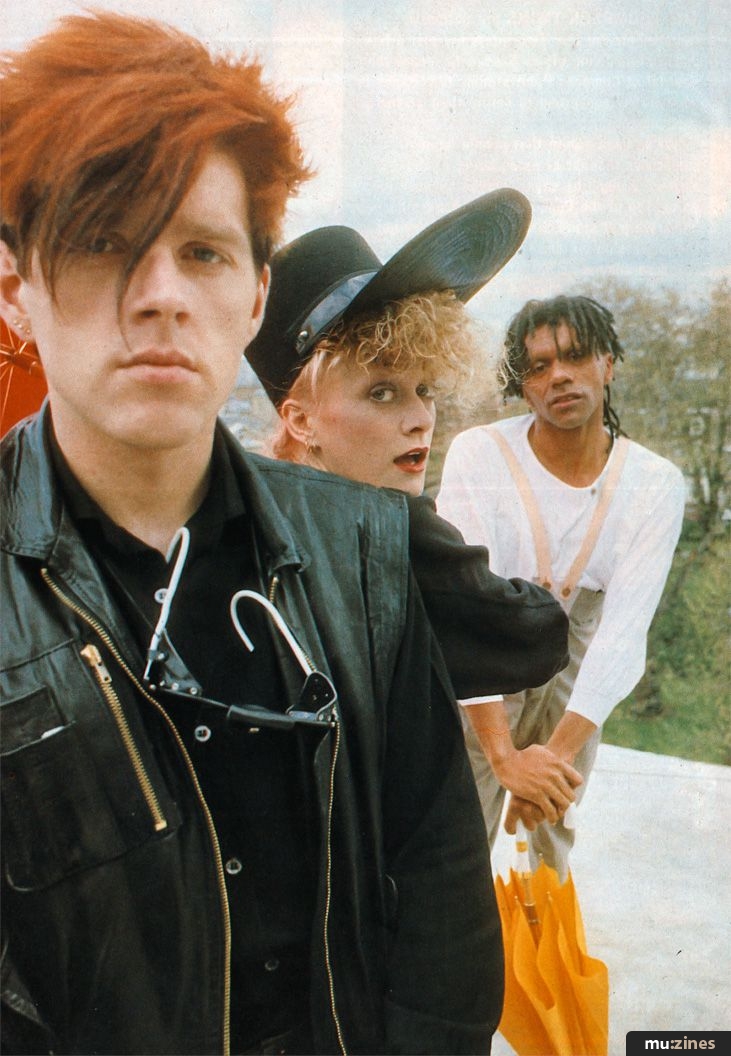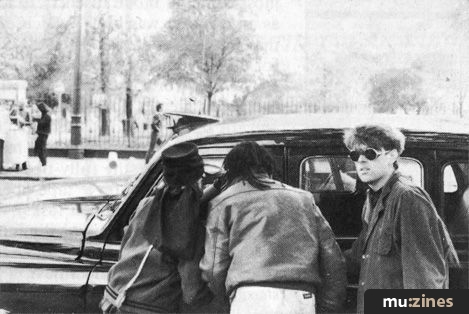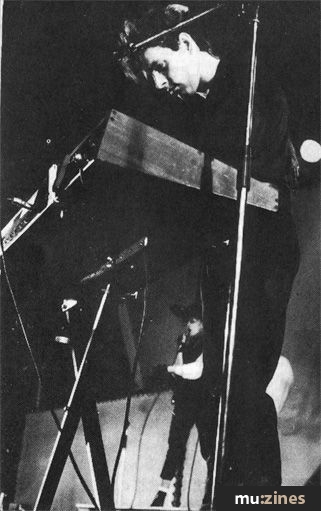Magazine Archive
Home -> Magazines -> Issues -> Articles in this issue -> View
A3 | |
Thompson TwinsArticle from One Two Testing, January 1984 | |
Three Of A Kind.
A threesome revealed: the Thompson Twins talk tools, tours and tapes.

THE THOMPSON TWINS are gathered together for the One Two interview just a few days before flying off to Nassau to record their new LP at Compass Point studio. Tom Bailey is immediately concerned to define their status as musicians.
"We've been aware that people have sometimes thought of us as being a 'non-serious' group," he says, "maybe because we go on Top of the Pops and don't have a backing band, we just stand there and sing. They get the impression we don't play on our records."
And so, almost as an act of exorcism, the three Twins - Tom, Alannah Currie, and Joe Leeway — spend an explanatory hour or two detailing just what, how, why and when they go about their business, laying the ghost of the invisible session player firmly to rest in the process.
Things have changed, too.
In 1982, for the 'Quick Step' LP, the Twins concentrated on the danceability of the material, establishing a groove and then spreading melodies over the top. Now, they're back to starting from the bare essentials of the song. "We want to write songs that you can sit down and play at the piano," Alannah says of the new material.
Not that experimentation or decoration goes out the window. Nor conflict. Tom says that they're toying with the idea of using four consecutive B-sides as opportunities to play around a little more — but Alannah isn't so sure. "I'm not in this band to do arty-farty rubbish!" she protests in mock-offended tones. "I want to make good pop songs on the B-sides... I really like 'Beach Culture' on the other side of 'Lies'. It was more or less made up in the studio, and it's a great fun-to-do relief from the other stuff which is very contrived and worked-on."
Changes, also, in line-ups: the TTs have gradually slimmed down from a seven-piece band to a self-contained trio. Perhaps they even characterise the technology-triggered shift that is happening in some musical areas, where a few people can make more sound than a big group and, most importantly, can have direct and total control over that sound. Tom nods in agreement. "It's like Fripp, he said about being small, mobile and intelligent. It's the best way to do it these days."
Success aids the execution of theories. "The demands of success are much greater than the demands of non-success," suggests Tom. Fair enough. "As the Thompson Twins we've got a peak point in our careers which we're just entering into. And during that time we're going to work flat out."
But technological aids can work against you — and we're back to fending off the 'non-serious' tag. In fact the last single 'Hold Me Now' and its relatively conventional sounds (bass, guitar, synth, congas, piano, marimbas...) exhibits a shift too in its simpler instrumentation. "It was partly to compensate for the feeling that we weren't really musicians," says Tom. "It's when people say: If they're doing anything with computers then it can't be real, they must be cheating, press a button and it does it for them. So we're actually here playing things on the video. They can't accuse us of cheating with technology."

INSTRUMENTS
ALANNAH HAS A THEORY about instrumentation. "Different parts of your body respond in different ways," she says. "The bass, that's hips, bums. 'Watching Me, Watching You' I always assumed was a bum-mover. Tambourines are fingers or the top of your head, or your ears..."
To commence, then, with the bum. The impressive bass sound on "Quick Step" was fallen upon by accident as Tom wrestled with his Oberheim OBXa two-thirds of the way through recording — and it was such a good bass sound that he went back and re-did all the bass parts with it. Higher up the keyboard the patch sounds more like a Clavinet, but deep down is that rich, almost fretless-like quality which permeates "Quick Step".
"What's nice about it is that you can mix it ridiculously over-loud and it doesn't get in the way," says the inventor, mentioning the sound's "natural compression" in passing. And as someone who used to play electric bass in older versions of the TTs, Tom evidently knows a good bass sound when he hears one. Or four.
"'Loves Lies Bleeding' was a combination of three Oberheim basses and one real Fender for the slapping and tickling. The three Oberheims are doing different parts of the same line, accumulated as ideas: I thought the bassline should be like this, or like this, no, like this; what do they sound like all together? And then some slaps on the Fender on top as well."
The OBXa Tom describes as his workhorse, and it's rarely disconnected from an AMS digital reverb ("very expensive and very good") and a Roland Dimension D ("it spits it out of the mix").
Joe, however, is saddled with a rather problematic Prophet-5, one of a duff batch of 500 or so sold in summer 1982 and which never seems to run for more than a week or two without going wonky. "If you have any sway with Prophet," Joe ventures, "tell them that I am pissed off, and I would not recommend it to anyone. So they'd better pull their socks up." I tell him I have no sway. Joe sulks, and returns to his copy of One Two.
The unrelated ones have also been fooling around with a prototype Movement Mimic — "it's like a monophonic Emulator" — but it's a bit weak on top-end sounds and sampling time is only a second. Sometimes they've used it at demo stage where it can be handy for something like a quick tuned cowbell. But electronics haven't threatened Alannah's real percussion at all.
Lately she's found more time for tuned percussion — a Yamaha xylophone, and an altogether more unwieldy set of (hired) marimbas which provide a "bonnng!" on "Hold Me Now" (and which can be seen on the video). But live percussion can get frustrating.
"Yeah, it's so hard to mike up," she confirms. "I used to use four PZM mikes underneath the xylophone, but I wanted something I could turn up full volume. All these concerts, I'm sick of going plinkle-plinkle-plinkle!"
Her live kit centres on timbales, the xylophone, and a rack of hand-held odds and sods: guiros ("I love them"), cowbells, vibraslaps, tambourines and the like. In the studio, it's a case of using whatever makes a suitable noise. And cases of toys are brought in: broom handles, iron bars, woodblocks, roto-toms, you name it.
Electronic drum sounds come from the innards of their Movement Drum Computer, triggered live by a Simmons kit (though with real snare drum — join the club). Thus they are able to take the exact studio sounds on the road with them.
"I really like the Movement," says Tom. "I suppose there's an extent to which you like what you know, because you can get the best out of it. To be honest it's like a fancy Linndrum, except that it's got that element of visual interaction. Everything's clearly laid out... the song's built up in a very visual way and becomes like a visual pattern."
You'll find more on the Movement's mechanics in One Two's Kajagoogoo feature in number four: Tom's criticisms linger around the wish for more rhythms per "page". "But the final advantage of a drum computer," Tom reckons, "especially as we deal in dance mixes a lot, is that you can edit so easily. A chorus at the beginning of your song is going to be exactly the same length as another chorus, so you can swap them."
And so to the voice. Tom: "I think I'm a really bad singer. If I was to be really honest and say that there's an area where I need to do a serious upgrading, it would be the vocals. I'm just lazy. Some people actually like the fact that I'm a bit croaky, and shout. I always say that one of my ancestors was a duck. Quack!"
PLAYING LIVE

JOE PROBABLY HAS A THEORY or two about playing live, but he was still too busy reading his copy of One Two actually to put them into words.
Theories aside, Thompson Twins live use "the sequences and some of the percussion on tape." The rest is what you see (hear).
Tom: "Live, we have that stuff on four-track reel-to-reel; it has a left-and-right mix for out-front on tracks one and two, a common mix on the third track for our monitors, and on the fourth track there's a click for the drummer (Simmons triggering the Movement) to play with.
"Basically, then, the drummer's playing with the click which we don't hear — hopefully he's playing in time with the click, and we play in time with the drums. And it all adds up — though it can lead to some scary moments."
Ready to be scared? Right then. You are in Germany. You rush on stage to an uproarious, approving cheer from a couple of thousand Teutonic throats. Cue tape. And it's running at double-speed! What larks! More to the point, what do you do? Who do you turn to at a time like that? Do you go ahead and sing in double time? They wouldn't tell me. Scary though, ay?
Tom has more plans for the live tape — it sounds like the group's own Tascam 8-track could be roped into live service if this goes on. "What I'm thinking about is putting some of the computer codes on to tape," he explains. "We have tried in the past but not very successfully, so we've steered clear.
You've got to be very trusting with the computer; I hate it when you see technologically-oriented shows which consist of a great song followed by five minutes of fiddling around with the machines and 'I'll be with you in a minute'. Some innovators have suffered from this, they can't get their complicated technological systems to entertain. Computers can't tell jokes in between numbers."
This is absolutely true. On the other hand, Tom adds, people who criticise the advance of technology are, are... he can't quite find the right word.
"Are berks!" exclaims Alannah. This is absolutely true, also.
As well as the tape, there are of course musicians brought in specially for the tours. These include such diverse creatures as a bassist, a drummer, two keyboardists, and so on. They're generally told to listen to the relevant records and copy the part as exactly as possible.
"This is easy for the drummer and bassist," says Tom, "they can obviously tell what the drum and bass parts are, but the keyboard players have to be told which line to follow in each song.
"Also, I look at the players, look at their instruments, and see what their natural predisposition is. I'm fairly fascistic in that I say: 'You will play this.' But it's not an inconsidered statement. I always look at them and see what suits them."
Choosing their road musicians in the first place can involve such basic considerations as: do we want to spend a good deal of time with these people? "They've got to be people you get along with," says Alannah, simply, but to the point.
So what sort of people make good touring musicians?
"Weirdos!" propounds Alannah.
"The peculiar irony," seconds Tom, "is that they've got to be sane enough to take the pressure, but they've got to be crazy enough to want to do it in the first place."
RECORDING

TOM HAS A THEORY about recording. "I think the secret when you're in the studio is to make your records so bright that you can hardly bear to listen to them on loud playback," he says.
"Every component sound has got to have that breadth, that bite to it, but overall the mix should almost make you want to put your hands on your ears. So that by the time it's been cut, it's on to vinyl, and it's played on some crappy little system that hasn't got good tweeters anyway, or through the radio, you've still got an exciting record. That's what highs are all about, excitement."
A quick step back to the Twins' demoes would be instructive here. These are recorded 8-track (usually in the confines of a house specially hired at writing times) on to their own Tascam 38 8-track reel-to-reel via a Teac 24-into-8 mixer. Their demo 8-track spool accompanies them to the "real" recording session where it's laid off on to tracks one to eight of the studio's multitrack (typically 24-track). The timecode from the 8-track retriggers all the drums which go on to, say, tracks nine to 20, and then the demo parts are gradually replaced and refined.
Their studio guru is producer Alex Sadkin, who along with engineer Phil Thornally is responsible for the sound of the TTs' records. The Twins tell me that Sadkin is a calm man, that he is a balancing influence (maybe a pun, maybe not), and that he doesn't interfere with ideas, only sounds.
"The reason we got Alex in the first place," Alannah points out, "was because we'd listened to his Grace Jones tapes. I was particularly impressed by the way he treated percussion... it's a thing in itself with Alex, I could hear what I was doing with him."
If you've had a glance at the "Hold Me Now" single sleeve, you might have got the impression that the Thompsons were going to go it alone on production now: "Produced by Tom Bailey" it says. On the label, however, there's "Produced by Alex Sadkin and Tom Bailey". What gives? They'd considered producing the whole of the new album (including "Hold Me Now"), but Tom decided that they wouldn't be able to afford the psychiatry fees. "A producer is cheaper than a psychiatrist," he laughs.

Image credit: Andrew Catlin
What happened with "Hold Me Now" was that Alex had been tied up Down Under (always painful), putting the finishing touches to his co-production on Duran Duran's new "Seven And The Ragged Tiger" LP. So the Twins, with Tom at the helm, recorded and mixed "Hold Me Now" at RAK studios in London, and the picture bags were printed up with this in mind. Then, all of a sudden, back comes an out-of-breath Sadkin keen to twiddle a knob or 20, and there's the released mix. Hence the label. Got it? Good.
Not that we'll leave the "Hold Me Now" sessions just yet. For we must find out why it could be the Twins' last recording on 48-track.
RAK is something of a hit factory: "It's in the atmosphere," says Tom. "Not 'acoustically designed', but something that's grown out of the tradition of making hit records. It might not have been worked out with a dB meter, but it's been worked out by Mickie Most, which is just as good as far as I'm concerned."
But 48-track? This involves linking two 24-track tape recorders together in sync (meaning, in reality, 46-track, as a track of each carries the linking code). For the TTs, include a track of computer codes that have to run in sync too. The muddle arose from trying to keep everything in time ("a real pain," according to Tom). The link did go awry at one point, about eight minutes into a song. "Luckily it was just after the main choruses," says Tom, "so it was just instrumental doodling at that point. If it had happened in the middle of the song it would have been a week's work down the drain."
But all thoughts now are on Nassau and the new album. And things are going rather well, aren't they? "I was thinking," muses Tom, "we've accumulated what is obviously now a winning team between those people who stand in the control room. This week (early November '83) Alex has a single at number three (Duran Duran's 'Union Of The Snake'), Phil's got a single at number 12 (The Cure's 'Love Cats'). I worked on the Will Powers thing which is at number 17, and we've just released 'Hold Me Now' which everyone says is gonna go Top Five for Christmas.
"We've become like the high-powered moguls of the hit-parade," some giggling here, "which we dreamed about two years ago. It's ridiculous, isn't it?" he concludes, and everyone dissolves in tears of laughter.
More with this artist
All For One and One For All (Thompson Twins) |
Thompson Twining (Thompson Twins) |
Ask Thompson (Thompson Twins) |
Publisher: One Two Testing - IPC Magazines Ltd, Northern & Shell Ltd.
The current copyright owner/s of this content may differ from the originally published copyright notice.
More details on copyright ownership...
Interview by Tony Bacon
Help Support The Things You Love
mu:zines is the result of thousands of hours of effort, and will require many thousands more going forward to reach our goals of getting all this content online.
If you value this resource, you can support this project - it really helps!
Donations for January 2026
Issues donated this month: 0
New issues that have been donated or scanned for us this month.
Funds donated this month: £0.00
All donations and support are gratefully appreciated - thank you.
Magazines Needed - Can You Help?
Do you have any of these magazine issues?
If so, and you can donate, lend or scan them to help complete our archive, please get in touch via the Contribute page - thanks!











